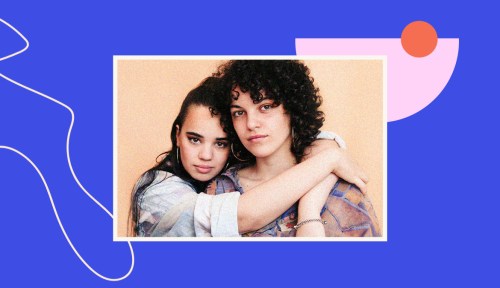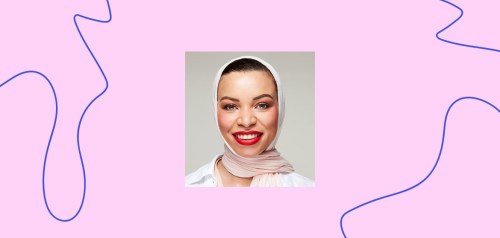Why Blair Imani Thinks Community—Not Competition—Is Inherent to Womanhood
To Blair Imani, community is inherent to the meaning of womanhood, whereas competition among women is a product of the patriarchy.

The pop-culture tropes of the mean girl á la Regina George and the Miranda Priestly-style bossy woman, from Devil Wears Prada, seem to imply that jealousy and competition are central features of relationships among women—as if it’s our natural state to be in competition with one another. But what these depictions leave out are the major societal forces that have sparked this tendency to compete—like, for starters, restrictive beauty ideals and a patriarchal society that often leaves very few seats at the table for women. Indeed, competition among women is far more a product of our environment than it is inherent to womanhood, argues writer, activist, and historian Blair Imani. By contrast, it’s a sense of community, she says, that lies at the core of womanhood and is worth celebrating.
Experts in This Article
author, educator, historian, and advocate. She is the creator of the viral web series Smarter in Seconds, co-owner of Fempower Beauty and Head of Education at FEMINIST.
This topic is a key part of the conversation on this week’s episode of The Well+Good Podcast, during which host Taylor Camille speaks with Imani about her perceptions of womanhood in honor of Women’s History Month. They delve into why it’s important to recognize how far women have come on the road to gender equity (and how far we can still go) and how women can and do support each other in the face of challenges along the way.
“Women supporting women is something that we have down pat in our community.”—Blair Imani, author and historian
“Women supporting women is something that we have down pat in our community,” says Imani. “As much as people like to mischaracterize women as being competitive, that [is often] just internalized toxic masculinity or productivity—but what it isn’t is inherent to womanhood.”
Listen to the full podcast episode here:
Why author and historian Blair Imani says community is an inherent part of womanhood
On the episode, Imani shares an anecdote about a recent time when she was feeling overwhelmed with her activism work and communicated this sentiment to her followers. “[A friend] sent me a voice note and was like, ‘Hey, sis, I saw your story. I just want you to know that you don’t have to perform for us. You don’t have to do anything that you don’t want to do.’ And I almost started crying,” she says. “I think having that extra encouragement [from other women] is really important.”
Imani sees this level of community care as the rule in womanhood, not the exception. Again, the mischaracterization of women as inherently competitive or always ready to get into “cat fights” stems from a patriarchal society that pits them against one another. In this framework, which devalues women, they may feel the need to adopt more stereotypically male behaviors—like overt competitiveness or toxic productivity—to get ahead in what is often labeled “Queen Bee Syndrome.” In other cases, women may have the perception that they need to be in the room, so to speak, and do whatever it takes to get there in order to fight for and secure progress and equity (even if it means stepping over other women on the way).
But these realities of women in the patriarchy don’t negate the fact that community is actually central to womanhood, according to Imani. And gestures like that of her friend, above, who reached out to offer her support are far more emblematic of what it actually means to be a woman, she says.

That isn’t to say that real womanhood looks one way, however. Part of honoring women is recognizing that womanhood does not have one specific definition or demeanor. “[What it means to be a woman] doesn’t have to be exclusively softness, and it doesn’t have to be exclusively resilience,” says Imani. “It can just be unlabeled and unconstrained.”
This perception of womanhood is also inclusive of anyone who identifies as a woman, no matter their biological sex or sexual orientation. And that’s especially important to remember now, amid the onslaught of anti-trans legislation (including bans on drag and gender-affirming care) being introduced and signed into law across the country, adds Imani. To maintain the culture of community inherent in womanhood, she says, it’s essential not to cede ground to those who would harm us and divide us.
“The more often we participate and entertain conversations that narrowly define what it means to be a woman, man, or human being, the more we are allowing the infiltration of people who want to take away human rights,” she says.
The idea that every group of disenfranchised people must fight for their rights alone isn’t true. Coming together and bolstering community is a better way to be involved, says Imani. “We can be collectives, and we can be nimble about what it means to be a collective,” she says.
To learn more information about the importance of Women’s History Month and what womanhood means to Imani, listen to the full episode here.
Sign Up for Our Daily Newsletter
Get all the latest in wellness, trends, food, fitness, beauty, and more delivered right to your inbox.
Got it, you've been added to our email list.








